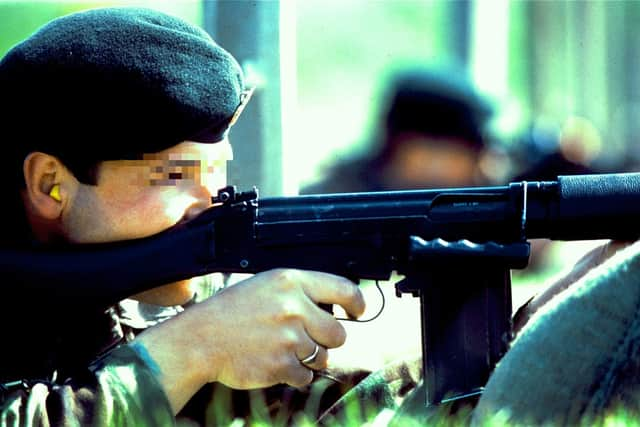Another 'Soldier F' to be prosecuted for murder over a 1972 Troubles shooting - namely the killing of Patrick McVeigh by the 'Military Reaction Force'
and live on Freeview channel 276
The ex-soldier and three other veterans are also facing attempted murder counts related to incidents in the same year, the PPS said.
Soldier F is accused of the murder of Patrick McVeigh, 44, who was shot at the junction of Finaghy Road North and Riverdale Park South in the city on May 13 1972.
Advertisement
Hide AdAdvertisement
Hide AdHe will also face prosecution for the attempted murder of four other victims wounded in the same incident.


Soldier F and three other former soldiers – known as Soldiers B, C and D – are to be prosecuted for attempted murder of two victims during a shooting incident in Slievegallion Drive on May 12 1972.
The soldiers all belonged to temporary Army unit, known as the Military Reaction Force (MRF), that was operating in Belfast in 1972.
As the prosecution decisions have now been taken, the cases will not be affected by a contentious Government legacy law that will axe all future prosecutions related to the Troubles from May 1 this year.
Advertisement
Hide AdAdvertisement
Hide AdThe PPS has announced decisions on two files submitted by the PSNI's Legacy Investigation Branch following investigations into the activities of the MRF.
The second file related the actions of another MRF unit and involved an incident in which Daniel Rooney, 18, was shot dead in St James's Road in Belfast on September 26 1972 and a second man suffered a gunshot wound.
Police reported two former soldiers, known as Soldiers A and C, for consideration on this file, with both considered for the potential charge of murder and attempted murder.
The PPS has concluded that there is insufficient evidence to prosecute any individual for any offence.
Advertisement
Hide AdAdvertisement
Hide AdThe reasons for the decision included difficulties with the admissibility of accounts obtained from the soldiers in 1972 and the inability of a series of recent forensic examinations to provide evidence capable of resolving significant conflicts within the evidence.
Some of the anonymised letter ciphers given to the soldiers involved in the cases are the same as ones used in other historical prosecutions in Northern Ireland, such as Soldier F in the Bloody Sunday case, but they are not the same individuals.
In relation to the other incidents covered in the first file, the PPS also decided not to prosecute the one surviving suspect in relation to a shooting incident at Silvio Street on May 26 1972 in which no one was injured.
Prosecutors also decided not to prosecute one surviving suspect in relation to an incident at the Glen Road Bus Terminus on June 22 1972 in which four victims suffered gunshot wounds.
Advertisement
Hide AdAdvertisement
Hide AdThe police also investigated a shooting on the Glen Road on May 6 1972 in which one victim suffered a gunshot wound.
However, no decision was issued in that case as all the suspects are dead.
The PPS said the surviving suspects in the Silvio Street incident and the shooting at the Glen Road Bus Terminus had not discharged their weapons and there was insufficient evidence to establish that they were party to any joint enterprise with those soldiers, now deceased, who had fired.
PPS assistant director Martin Hardy said all victims and families involved in the investigations were informed of the decisions on Thursday.
Advertisement
Hide AdAdvertisement
Hide Ad"Regardless of the differing outcomes in relation to each incident examined, we in the PPS recognise that this is a painful day for all victims and families involved and that they have waited a long time to reach this stage of the process," he said.
"Where a decision to prosecute has been taken, I would emphasise that criminal proceedings will commence in due course and there should be no reporting, commentary or sharing of information which could in any way prejudice these proceedings. We will keep in touch with the relevant victims and families as these cases progress.
"Where a decision not to prosecute has been taken, I can assure victims and families involved that the prosecution team, which included an independent senior barrister, considered the available evidence thoroughly, independently and impartially.
"A prosecution can only be brought when the evidence presents a reasonable prospect of conviction at court for any reported individual. Each case is considered in light of its own individual facts and circumstances.
Advertisement
Hide AdAdvertisement
Hide Ad"In these decisions not to prosecute, the admissibility, availability and sufficiency of evidence were key factors in reaching a conclusion that the test for prosecution was not met."
Mr Hardy said victims and families who were notified of a decision not to prosecute had received a detailed written explanation of the reasons, along with an offer to meet the prosecution team.
In November 2013 the then director of public prosecutions, Barra McGrory KC, referred the case to the PSNI for investigation following revelations in a BBC Panorama programme.